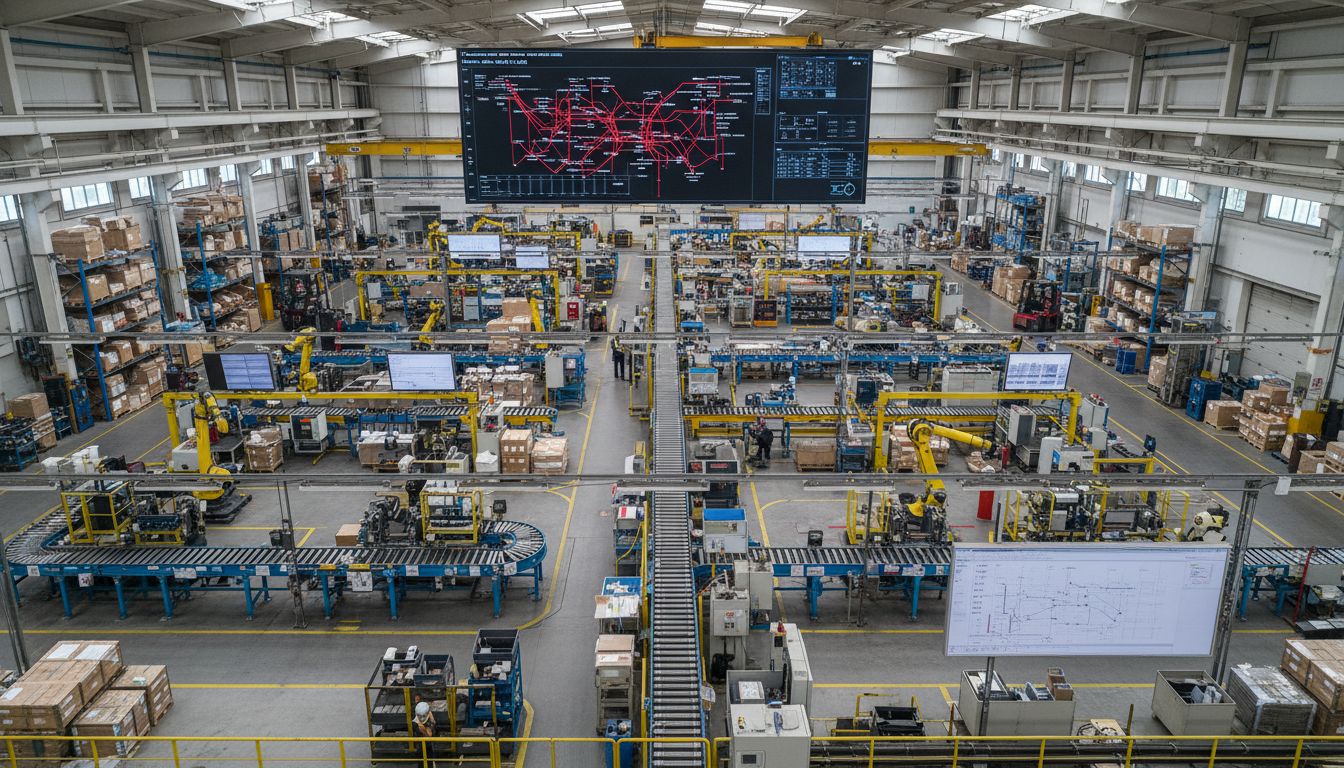Understanding Why Teams Need AI for Success

Artificial intelligence is quickly changing how teams work together and solve problems. Teams using AI can process and analyze information at speeds humans can only dream of and according to MIT research, AI can now monitor team interactions in real time to promote more effective collaboration. That sounds like a recipe for replacing people entirely but the real story is different. AI is not here to take over, it is here to make teams smarter and even more creative than before.
Table of Contents
- What Is Ai And Its Role In Teams?
- Why Ai Adoption Is Crucial For Business Teams
- How Ai Enhances Team Collaboration And Efficiency
- Key Concepts Behind Ai Implementation In Teams
- Real-World Examples Of Teams Using Ai Effectively
Quick Summary
| Takeaway | Explanation |
|---|---|
| AI enhances team collaboration and efficiency | By processing data quickly, AI enables teams to work more effectively, improving communication and insight generation. |
| AI should be seen as a partner, not a replacement | Embracing AI as a collaborative tool helps augment human capabilities, leading to greater innovation and productivity. |
| Successful AI integration requires human involvement | Teams must actively guide AI applications to ensure they align with organizational goals and improve overall outcomes. |
| AI adoption is essential for competitive advantage | Businesses that effectively leverage AI can enhance operational efficiency and make informed strategic decisions. |
| Focus on cultural transformation with AI | Integrating AI technology involves fostering a culture of adaptation and learning to maximize its potential within teams. |
What is AI and Its Role in Teams?
Artificial Intelligence represents a revolutionary technological capability that transforms how teams operate, collaborate, and solve complex problems. Unlike traditional software, AI systems can learn, adapt, and make intelligent decisions by processing vast amounts of data with remarkable speed and precision.
Understanding AI as a Team Collaboration Tool
AI is not a replacement for human workers but a powerful augmentation tool designed to enhance team capabilities. According to research from the Software Engineering Institute, successful AI integration requires viewing these technologies as “silent partners” within organizational workflows.
Key characteristics of AI in team environments include:
- Ability to process and analyze complex datasets quickly
- Generating insights that humans might overlook
- Automating repetitive tasks to free human creativity
- Providing predictive analytics for strategic decision making
Strategic AI Implementation in Team Dynamics
Effective AI integration demands more than technological implementation. Business leaders must cultivate a collaborative approach where human expertise guides AI systems. Teams need to understand that AI tools are most powerful when they complement human skills rather than attempt to replicate them entirely.
At Average Robot, we emphasize that AI success hinges on human-centered design. Our approach prioritizes team involvement in AI strategy, ensuring that technological solutions align with specific organizational goals. Learn more about owner-led AI adoption strategies that transform how businesses leverage artificial intelligence.
Ultimately, AI represents a strategic partnership between human intelligence and technological capability. By understanding its potential and implementing it thoughtfully, teams can unlock unprecedented levels of efficiency, innovation, and competitive advantage.
The following table provides a side-by-side comparison of the roles played by AI versus humans in team environments, clarifying how each contributes to collaboration and business outcomes.
| Role/Function | AI Capabilities | Human Capabilities |
|---|---|---|
| Data Processing | Analyzes large datasets rapidly and accurately | Interprets data contextually; applies domain expertise |
| Task Automation | Automates routine, repetitive workflows | Handles complex, unstructured tasks creatively |
| Insight Generation | Uncovers patterns and insights from data | Generates innovative ideas; applies intuition |
| Decision Support | Provides predictive analytics and recommendations | Makes final judgments; understands organizational context |
| Collaboration | Enables seamless communication and task coordination | Builds relationships; negotiates and manages team dynamics |
Why AI Adoption is Crucial for Business Teams
In today’s rapidly evolving business landscape, AI adoption has transformed from an optional strategy to a critical competitive necessity. Teams that embrace artificial intelligence are positioning themselves to outperform competitors by dramatically enhancing operational efficiency, decision making, and strategic capabilities.
The Competitive Edge of AI Integration
AI offers businesses unprecedented opportunities to streamline processes and unlock hidden potential. According to research from the U.S. Census Bureau, even small businesses are leveraging AI technologies to boost productivity and remain competitive in challenging market environments.
Key advantages of AI adoption include:

- Accelerated data processing and analysis
- Enhanced predictive capabilities
- Reduced operational costs
- Improved strategic decision making
- Personalized customer experience strategies
Strategic Implications for Team Performance
Beyond technological advancement, AI represents a fundamental shift in how teams conceptualize work. Successful AI integration is not about replacing human talent, but augmenting human capabilities. Teams that view AI as a collaborative partner can achieve remarkable improvements in productivity and innovation.
Business leaders must recognize that AI implementation requires more than technological investment. It demands a cultural transformation where teams are empowered to learn, adapt, and work alongside intelligent systems. Explore how AI can future-proof your business strategies and unlock new levels of organizational potential.
Ultimately, AI adoption is about creating a more intelligent, responsive, and adaptive business ecosystem. By embracing these technologies strategically, teams can transform challenges into opportunities and drive sustainable growth in an increasingly complex global marketplace.
How AI Enhances Team Collaboration and Efficiency
Artificial intelligence is revolutionizing how teams communicate, collaborate, and achieve collective goals. By intelligently processing information and providing real-time insights, AI transforms traditional teamwork dynamics into more responsive, adaptive, and high-performing ecosystems.
Breaking Down Communication Barriers
AI technologies are redefining team interaction by providing sophisticated tools that transcend traditional communication limitations. According to research from MIT, AI can now actively monitor and optimize team interactions, ensuring smoother collaboration and more effective problem-solving.
Key collaborative advantages of AI include:
- Instantaneous translation and cross-language communication
- Real-time context and sentiment analysis
- Intelligent task allocation based on team member strengths
- Automated meeting summaries and action item tracking
- Predictive conflict resolution strategies
Intelligent Workflow Optimization
AI does not replace human creativity but amplifies team potential. By automating routine tasks and providing data-driven insights, AI enables team members to focus on high-value strategic work. These intelligent systems can analyze complex workflows, identify bottlenecks, and suggest optimization strategies that humans might overlook.
Discover how business leaders can leverage AI for team performance and unlock unprecedented levels of organizational efficiency. The future of teamwork is not about competing with technology, but collaborating intelligently with it.
Ultimately, AI represents a transformative force in team dynamics. By embracing these technologies thoughtfully, organizations can create more agile, intelligent, and responsive work environments that adapt quickly to changing business landscapes.
Key Concepts Behind AI Implementation in Teams
Successful AI implementation is not just about deploying advanced technologies but creating a strategic framework that aligns technological capabilities with human expertise. Understanding the fundamental principles driving AI integration is crucial for businesses seeking transformative organizational change.
The table below summarizes the foundational principles necessary for effective AI implementation within teams, helping readers quickly grasp each core concept and its role in successful adoption.
| Foundational Principle | Explanation |
|---|---|
| Clear AI Objectives | Define specific organizational goals for AI integration to ensure alignment with business needs. |
| Data Governance Frameworks | Develop robust practices for data management, security, and compliance to support AI accuracy. |
| Transparent Decision Making | Create processes that clarify how AI systems arrive at recommendations or decisions. |
| Continuous Learning & Adaptation | Implement mechanisms for ongoing team learning and AI system improvement over time. |
| Human Oversight & Ethics | Maintain human supervision of AI to ensure ethical use and address potential biases. |
Foundational AI Integration Principles
AI implementation requires a holistic approach that goes beyond technical deployment. According to the National Academies of Sciences, Engineering, and Medicine, effective AI integration supports teams by facilitating information sharing, enhancing coordination, and enabling sophisticated problem-solving mechanisms.
Key foundational concepts for AI implementation include:
- Establishing clear organizational AI objectives
- Developing robust data governance frameworks
- Creating transparent AI decision making processes
- Ensuring continuous learning and adaptation mechanisms
- Maintaining human oversight and ethical considerations
Strategic Human-AI Collaboration
Successful AI implementation centers on viewing artificial intelligence as a collaborative partner, not a replacement. Teams must develop a nuanced understanding that AI serves to augment human capabilities, providing insights and handling complex computational tasks while allowing human creativity and strategic thinking to drive core decision making.
Explore comprehensive owner-led AI adoption strategies that prioritize strategic alignment and team empowerment. The most effective AI implementations recognize that technology should enhance human potential, not diminish it.
Ultimately, AI implementation is a continuous journey of learning, adaptation, and strategic refinement. Organizations that approach AI as a dynamic, collaborative ecosystem will be best positioned to unlock unprecedented levels of innovation and operational efficiency.
Real-World Examples of Teams Using AI Effectively
Artificial intelligence is transforming how teams across diverse industries solve complex challenges, optimize performance, and drive innovation. By examining practical applications, businesses can understand the tangible benefits of strategic AI implementation and learn from successful organizational approaches.
Government and Public Sector Innovations
Public sector organizations are pioneering AI integration to enhance operational efficiency and service delivery. According to research from the U.S. Department of Labor, government teams are leveraging AI to streamline administrative processes and redirect human talent toward more strategic initiatives.
Notable AI implementation examples include:
- Automated procurement process management
- Intelligent document classification systems
- Enhanced decision support tools
- Predictive workforce planning
- Streamlined citizen service interactions
Corporate Performance and Productivity
AI is not just a technological upgrade but a strategic performance multiplier. Forward thinking teams are using AI to transform traditional workflow models, enabling more intelligent, responsive, and data driven decision making. By integrating AI tools, organizations can unlock unprecedented levels of operational insights and efficiency.

Explore how business leaders are revolutionizing team performance through intelligent technology adoption. The most successful implementations focus on augmenting human capabilities rather than replacing them.
Ultimately, effective AI adoption requires a nuanced approach that balances technological capability with human creativity. Teams that view AI as a collaborative partner will be best positioned to navigate increasingly complex business landscapes and drive sustainable competitive advantage.
Empower Your Team With a Proven AI Advantage
Teams today face mounting pressure to process complex information, increase efficiency, and create real business impact. As highlighted in “Understanding Why Teams Need AI for Success,” AI is not just a buzzword. It is a genuine partner in collaboration, helping teams overcome barriers like siloed communication, slow automation, and outdated workflows. Many leaders worry about the complexity and risk of AI adoption, especially when they want to preserve human expertise instead of replacing it.

Now is the time to take advantage of artificial intelligence and move beyond theory. Average Robot partners with $20m+ ARR business owners to simplify AI adoption, remove confusing jargon, and put tailored strategies into action. Discover how working directly with experienced strategists at Average Robot can help your team automate repetitive work, enhance morale, and stay ahead of competitors. Visit our main site to see how our step-by-step guides, automation roadmaps, and proven playbooks turn AI into tangible results for your organization. Book a consultation now and give your team the AI tools they need to drive true success.
Frequently Asked Questions
What is the role of AI in team collaboration?
AI acts as a powerful augmentation tool that enhances team capabilities by processing data quickly, generating insights, and automating repetitive tasks, allowing human creativity to flourish.
How can AI improve the efficiency of teams?
AI improves efficiency by automating routine tasks, providing predictive analytics, and optimizing workflows, which allows team members to focus on high-value strategic work rather than mundane activities.
Why is AI adoption essential for business success?
AI adoption is essential because it provides businesses with a competitive edge through accelerated data processing, enhanced decision-making capabilities, and improved operational efficiency, allowing teams to outperform competitors.
What foundational principles should guide AI implementation in teams?
Key foundational principles for AI implementation include establishing clear organizational objectives, developing data governance frameworks, ensuring ethical considerations, and maintaining human oversight while fostering continuous learning and adaptation.
Recommended
- About | Discover Opportunities - Schedule Today — Average Robot
- About | Discover Opportunities - Schedule Today — Average Robot
- Owner-Led AI Adoption Tips for Small Businesses — Average Robot
- Owner-Led AI Adoption Tips for Small Businesses — Average Robot
- The Impact of AI on SEO in 2025: Key Changes for Businesses
- Understanding the Impact of AI in Insurance 2025 - Digital Insurance Platform | IBSuite Insurance Software | Modern Insurance System




